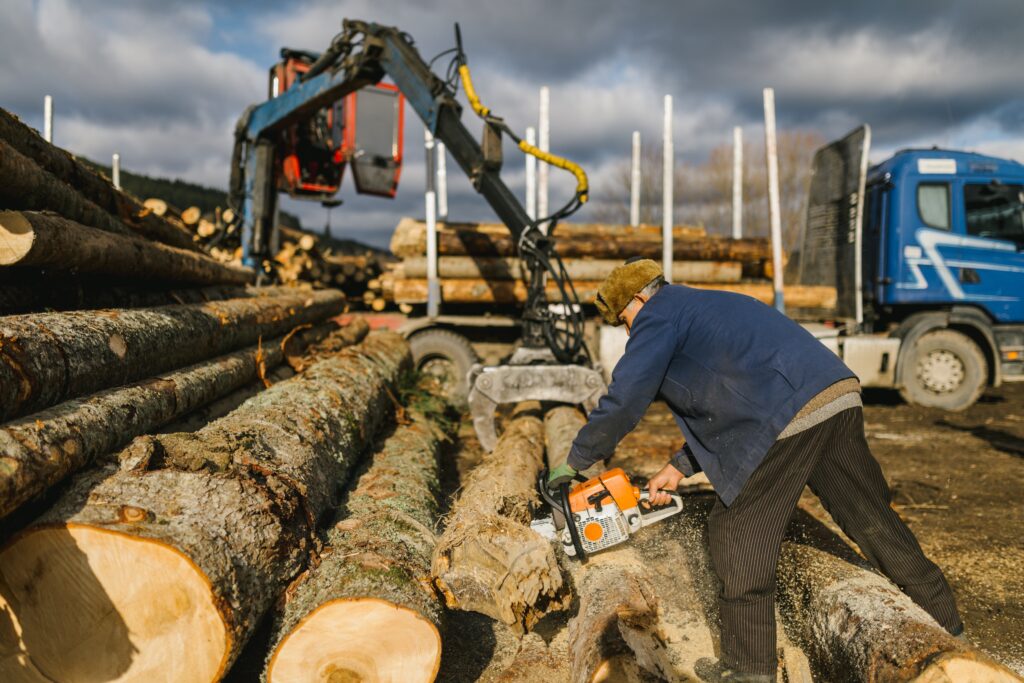 Executive Summary
Executive Summary
Canadian small and midsize enterprises (SMEs) contribute half of greenhouse gas emissions but are often overlooked in Canada’s strategies to support the transition to net zero. SMEs often lack access to resources, skills and specialized training to build resilience and support their net-zero transitions.
This report provides an investigation of existing competency frameworks for green skills in order to identify a framework suited to SMEs. We found current frameworks typically focus on new workforce training and large-enterprise models, and lack consideration of Canadian-specific regulations, smaller organization structures and accessible technical skills.
Our green-skills competency framework is structured to be applicable to existing workforces. It comprises three levels. First, all workers need foundational skills and basic green literacy. Second, workers can build on foundational knowledge to support the design, implementation and evaluation of green-transition programs within operations. A smaller group—as a third level— requires deep green skills required to innovate and develop sector-transforming green tech solutions. This framework addresses critical gaps in SME-applicable green transition frameworks, and it supports SMEs to decarbonize the interconnected global supply chain and circumvent barriers they face in limited expertise, personnel and resources. The framework continues to be refined through the Diversity Institute, external collaborators (PwC and Oxford) and Future Skills Centre partnerships.
Key Insights
Existing competency frameworks disproportionately focus on new workforce training and large-enterprise models, and do not include specific reference to regulatory requirements: collectively, these hinder the effective adoption of green skills frameworks by diverse Canadian SMEs.
Existing frameworks assume a certain level of knowledge or skill specialization within organizations that is not generally applicable to SMEs.
Existing green-skills frameworks focus on analytics or management, but few sufficiently discuss deep green skills––such as technical competencies like biotechnologies, green energy or waste management––which are important for sector innovation.
 The Issue
The Issue
Canadian SMEs make up about 99% of businesses, employ about 64% of private sector workers and generate nearly 30% of Canada’s emissions in direct operations. Digital skills and technology adoption are important for Canadian businesses to enhance resilience and reach net-zero emissions. Additionally, workers need further soft skills training in sustainability and natural resource management to support green transition projects. When businesses engage in emissions reductions, data show businesses realize cost savings and often gain market competitiveness. However, SMEs have fewer resources and skills and less specialized training to transition toward net-zero emissions compared to large firms.
Similarly, integrating equity, diversity and inclusion is essential in the transition to sustainable practice and resilience. Diversity Institute–led research shows women-managed enterprises are more effective at integrating sustainability into business operations, and a diversity in leadership translates into more green inventions. For diverse SMEs, building climate resilience requires explicit skills-based support. Without support, market transitions are volatile and unpredictable, and labour needs may not be met. Sector impacts are amplified for participants from equity-deserving groups, such as Black youth and newcomers, as well as Indigenous and remote communities. To properly foster sustainable jobs, no group or community can be left behind.
Green skills include technical expertise in STEM, architecture and design, as well as operational and business skills to implement sustainability throughout the value chain. Green skills draw on all workers having core environmental knowledge to understand the problem; many workers to implement, evaluate and adapt green technologies to their operations; and a few technically skilled workers to innovate. As environmental employment is expected to outpace the growth of the general employment market, skills-related measures for training new employees and employees transitioning to growing sectors and occupations are requisite.
Skills-based efforts produce necessary equity for workforce participants and ensure underrepresented communities do not endure the brunt of market and labour shifts. Many Canadian SMEs, however, are unaware of new regulations and green innovations, and struggle to change familiar practices. Diverse SMEs also struggle to access skills training.
This green skills competency framework is structured for existing workforces and to meet the growing need for green skills in the labour market. Leveraging industry expertise and international collaboration, our green skills competency framework serves to guide on the various technical green skills and sustainability competencies for SMEs that are elevated by foundational sustainability and environmental knowledge. The goal is to apply this competency framework to shape training programs, support workforce development and help businesses equitably integrate sustainable practices into their operations, ensuring future preparedness.

 What We Investigated
What We Investigated
This project sought to determine how a new green skills competency framework could effectively address the distinct challenges faced by diverse Canadian SMEs during the climate transition. We determined the current gaps in existing green skills and competencies frameworks for Canadian SMEs. We conducted a comparative analysis of existing competency frameworks, occupational databases, skills taxonomies and typologies to find key competency domains for green skills, technical skills, leadership and innovation. The core of this initiative involved thoroughly investigating existing frameworks in the career development ecosystem, and applying competencies to net-zero practices for Canadian SMEs.
Our first step included a detailed review of academic and industry research concerning green skills, as well as the specific needs of SMEs and their journeys toward achieving net-zero emissions. Following review of skills frameworks and typologies, we sought to identify common competency domains, including green literacy, essential soft skills, critical technical skills and leadership qualities, as well as to understand the structural organization and scope of these existing frameworks.
This research asks the following questions:
- What are the existing green skills competency and skills frameworks?
- Can these frameworks be adapted to the unique business context of Canadian SMEs?
The framework is designed specifically for Canadian SMEs, with a focus on upskilling existing workers––as opposed to developing a framework for a new workforce. The green skills framework is a structured method to enable existing workforces to adopt green technologies and innovations.
 What We’re Learning
What We’re Learning
The review of existing competency frameworks revealed the critical need for a green skills competency framework that targets Canadian SMEs.
First, current frameworks often focus on the skills and competencies for new sector participants, as opposed to workforce upskilling. This is especially pertinent, as job losses in carbon intensive industrial activities by SMEs often disproportionately affect youth and equity-deserving groups.
Second, competency frameworks focus on larger businesses and do not reflect the dynamic situation for SMEs, where employees often fulfil several organization functions and need a breadth of skills training.
Third, existing frameworks do not reference specific climate or environmental policies for SMEs, hindering businesses’ understanding of regulations and compliance.
Ultimately, this project has achieved a structured, accessible and progressive framework that addresses the specific challenges faced by Canadian SMEs in their journeys toward net-zero emissions.
The transition of sectors requires workers to be assisted toward adopting innovations and inventing green technologies. Foundationally, all workers need environmental literacy and competency in resilience and sustainability concepts and issues. Subsequently, workers can develop transformational skills to drive sustainable change across different business operations and organizational functions. A few workers will require more extensive training to innovate new technologies capable of sector transformation. These advanced competencies are necessary for innovation––developing and implementing disruptive technologies––to lead major sustainability efforts, and their applicability depends on the specific products and services offered by an SME.
The framework integrates core competencies adapted from Employment and Social Development Canada’s Skills for Success framework, including environmental literacy, problem solving, collaboration, communication, creativity and innovation, writing, and numeracy––all vital for SME “greenification.” This framework has undergone several stages of review with partner organizations, validating its practical application in developing training courses for SMEs.
 Why It Matters
Why It Matters
Insights of this framework represent a standardized set of skills needed to transition many Canadian SMEs to a resilient, net-zero economy. This sequential approach to transitioning the workforce will ensure sector-preparedness and that diverse voices will be amplified through a green workforce transition. A focus on existing workforce transitions ensures that equity-deserving groups are not disproportionately affected by workforce transitions. SMEs should use this framework to understand how they can incorporate decarbonization policies and values into business operations, ensure local and global regulatory compliance––especially where the value chain extends beyond the Canadian market––and thus strengthen their capacity to grow and innovate for market competitiveness.
Current competency frameworks often focus on the skills and competencies for new sector participants as opposed to workforce upskilling, are geared toward larger-enterprise models, and do not include information on specific policies or regulations to help SMEs with compliance in this green transition. There is a lack of strategies for achieving net zero through a transition of a diverse workforce among SMEs. A wider focus on SMEs in net zero is needed to ensure the extensive and diverse SME ecosystem of Canadian business operations is adequately supported to navigate net zero, as well as regional differences in business operations. Implications of this framework extend beyond SMEs to the broader Canadian economy. SMEs through to large corporations need green skills training to move beyond regulatory and emissions assurance compliance to reach Canada’s net-zero goals and to ultimately implement innovative strategies and generate market competitiveness for Canadian enterprise.

State of Skills:
Supporting Indigenous and Northern Entrepreneurship and SMEs
Indigenous and Northern entrepreneurship and businesses play a crucial role in bolstering local economies by supporting economic diversification, job creation and community development.
 What’s Next
What’s Next
Continued revision of this framework is important to ensure applicability to Canadian SMEs, as well as the broader Canadian economy. The Diversity Institute has partnered with Oxford University to conduct research about best practices and green policies for SMEs to adopt sustainable development goals, which will be used to refine this framework. Industry partnership with PwC (PricewaterhouseCoopers) will be used to garner feedback from SMEs and to refine this framework to ensure applicability to the Canadian SME ecosystem.
More from FSC
Career Development Professional Centre
Work in Manitoba
A Program for Young Moms in Northern Manitoba
Have questions about our work? Do you need access to a report in English or French? Please contact communications@fsc-ccf.ca.
How to Cite This Report
Diversity Institute. (2025) Project Insights Report: Greenification of Small and Medium-Sized Enterprises: Skills Competencies for Resilience and Sustainability. Toronto: Future Skills Centre. https://fsc-ccf.ca/research/greenification-of-smes/
Greenification of SMEs is funded by the Government of Canada’s Future Skills Program. The opinions and interpretations in this publication are those of the author and do not necessarily reflect those of the Government of Canada.




